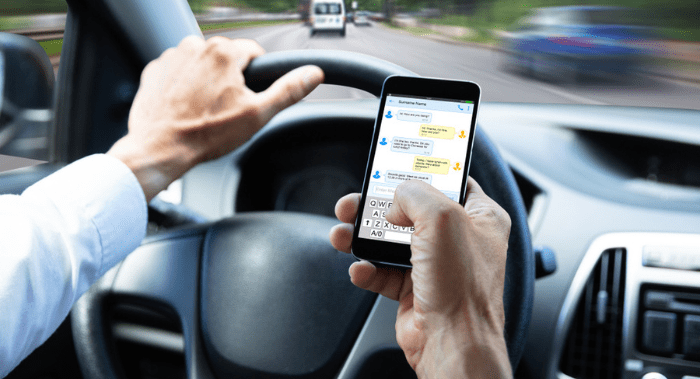Complete the form to schedule a free consultation with a traffic lawyer
Ohio Gets Serious About Texting While Driving

The act of texting while driving has been a safety concern for years, not just in the Buckeye State but throughout the entirety of the United States. The National Highway Traffic Safety Administration (NHTSA) reports that, between the years 2012 and 2020, over 29,000 deaths nationwide were due in some part to (if not directly caused by) texting while driving.
Now, a new bill looking to stem the tide of accidents and deaths related to texting and driving in Ohio is on its way to Governor DeWine’s desk for signature after having passed the Ohio General Assembly. Once the law becomes effective, House Bill 288 will provide law enforcement officers with new authority to stop drivers who are texting and driving and subsequently issue citations.
Enforcement of Ohio’s Old Texting-While-Driving Statute
Under Ohio’s current distracted-driving laws, texting while driving is still a prohibited act. Law enforcement officers can cite drivers that are observed to be using their phones to send or read electronic messages while operating a vehicle. If convicted, drivers over the age of 18 could face a $150 fine.
However, texting and driving in Ohio has been seen as a secondary offense instead of a primary traffic offense. As such, law enforcement officers can only cite drivers for committing the offense in connection with committing another traffic violation, such as speeding.
They cannot stop drivers solely for a citation for distracted driving. What this means is that — unless an officer sees you actively commit another traffic violation — you currently cannot be stopped and cited for a distracted-driving offense.
An officer must wait until they observe you committing another observable offense, such as reckless driving or speeding, before they can pull you over, where, in addition to citing you for that other offense, the officer may also cite you for texting while driving.
Primary Offense Means Officers Can Conduct Traffic Stops
One of the new law’s biggest changes to Ohio’s texting-while-driving laws is that the act of teaching while driving is now becoming a primary offense. As such, a law enforcement officer that observes you either holding a cell phone in your hand or otherwise using your body to support an electronic communications device has the authority to pull you over.
You may be violating the law if your car is in motion and you are:
- Holding your phone in your hand in order to read a text message
- Using one hand to type a message while supporting your phone on your leg
- Holding onto your cell phone but not sending or receiving any message
Officers may still also cite you for any other traffic violation they see you commit, but under this new law, officers will not need to wait for you to commit another violation before stopping you for texting while driving.
Exceptions to Ohio’s Texting-While-Driving Law
There remain several exceptions to the new bill that, if any apply, will exempt you from being found guilty of violating the texting-while-driving law. While they may not necessarily save you from being stopped and cited, an exemption would mean you’ll avoid having to pay a fine and have the offense listed on your driving record.
The exceptions set forth in the statute include the following situations:
Public Emergency Exceptions
If you are calling, texting, or otherwise contacting the police, fire department, a hospital, or another similar entity or person while you are in an emergency, you will be exempted from the law. You are permitted to hold your phone to make a call, send a text, or send an email in these circumstances.
Similarly, first responders and public safety workers who are driving a public safety vehicle and using their phones for the performance of their duties do not violate the law.
Using the Phone While in Stationary Traffic
The law permits you to use your cell phone to send and receive messages if you are stationary and parked alongside the road, at a red traffic light, or parked on a road that has been closed for an emergency or some other reason.
Making a Phone Call
You are permitted to make or receive a phone call while holding your cell phone up to your ear, so long as you do not manually enter any letters, symbols, or numbers into your cell phone in order to do so. You could not, for example, manually dial a number to make a call.
Other Exceptions
The law makes other exceptions for individuals using their phones to navigate or receive information about safety issues, using mobile data terminals in commercial vehicles, and wearing a cell phone on their person in a holster.
Experienced Legal Help with Ohio Distracted Driving Tickets
TicketVoid matches drivers in Ohio and elsewhere with experienced, qualified lawyers who can help them resolve their traffic tickets. If you get cited under Ohio’s new texting-while-driving law, call TicketVoid at 888-296-3059, or visit our website to complete our free online form and get connected with an Ohio distracted-driving lawyer today.
Recent Posts
-
What's a Good Excuse to Get Out of a Speeding Ticket? Legal Defense Strategies That Work
-
How Successful is Defending Yourself in Court for Traffic Violations?
-
Is Fighting a Traffic Ticket Worth It? Cost Analysis Guide
-
What Is the Best Defense Against a Ticket: Complete Legal Defense Guide for Drivers
-
How to Argue a Traffic Ticket in Court Successfully
